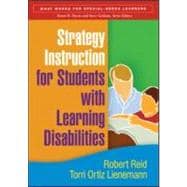Practical and accessible, this book provides the first step-by-step guide to cognitive strategy instruction, which has been shown to be one of the most effective instructional techniques for students with learning problems. Presented are proven strategies that students can use to improve their self-regulated learning, study skills, and performance in specific content areas, including written language, reading, and math. Clear directions for teaching the strategies in the elementary or secondary classroom are accompanied by sample lesson plans and many concrete examples. Enhancing the book's hands-on utility are more than 20 reproducible worksheets and forms.








